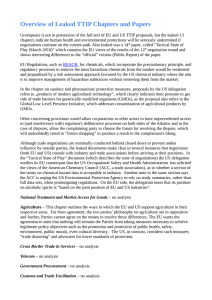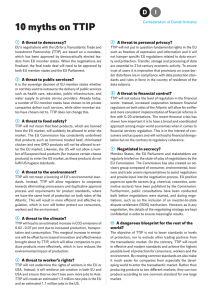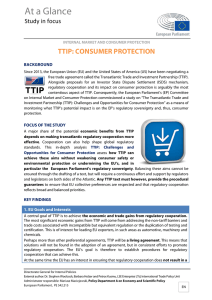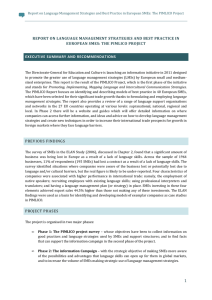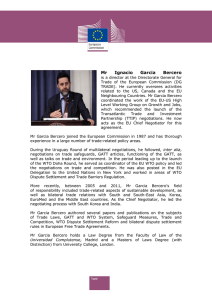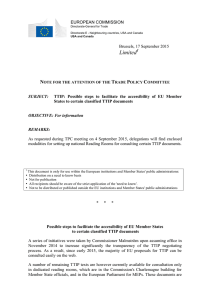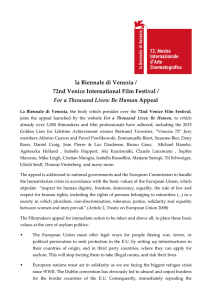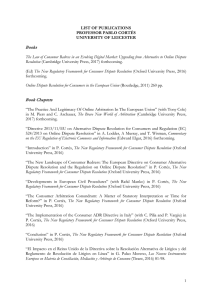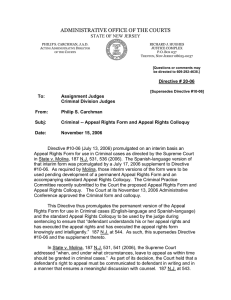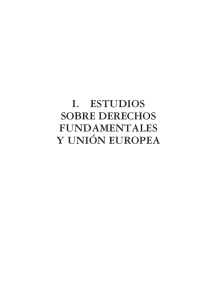Why the new EU proposal for an Investment Court System in TTIP is
Anuncio
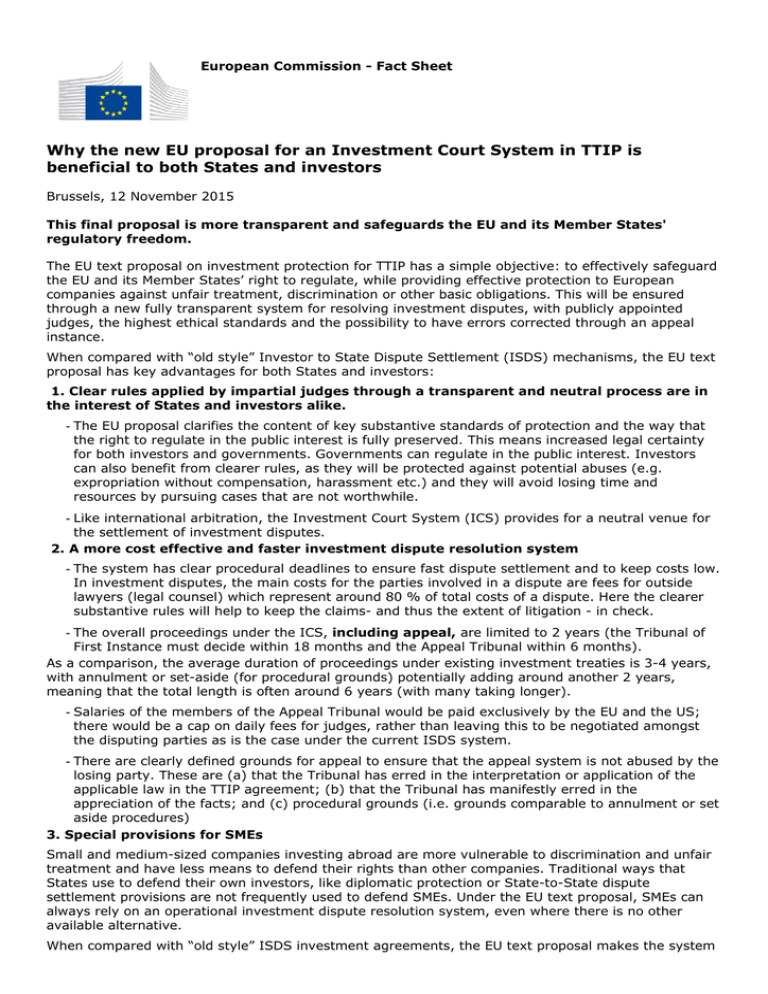
European Commission - Fact Sheet Why the new EU proposal for an Investment Court System in TTIP is beneficial to both States and investors Brussels, 12 November 2015 This final proposal is more transparent and safeguards the EU and its Member States' regulatory freedom. The EU text proposal on investment protection for TTIP has a simple objective: to effectively safeguard the EU and its Member States’ right to regulate, while providing effective protection to European companies against unfair treatment, discrimination or other basic obligations. This will be ensured through a new fully transparent system for resolving investment disputes, with publicly appointed judges, the highest ethical standards and the possibility to have errors corrected through an appeal instance. When compared with “old style” Investor to State Dispute Settlement (ISDS) mechanisms, the EU text proposal has key advantages for both States and investors: 1. Clear rules applied by impartial judges through a transparent and neutral process are in the interest of States and investors alike. - The EU proposal clarifies the content of key substantive standards of protection and the way that the right to regulate in the public interest is fully preserved. This means increased legal certainty for both investors and governments. Governments can regulate in the public interest. Investors can also benefit from clearer rules, as they will be protected against potential abuses (e.g. expropriation without compensation, harassment etc.) and they will avoid losing time and resources by pursuing cases that are not worthwhile. - Like international arbitration, the Investment Court System (ICS) provides for a neutral venue for the settlement of investment disputes. 2. A more cost effective and faster investment dispute resolution system - The system has clear procedural deadlines to ensure fast dispute settlement and to keep costs low. In investment disputes, the main costs for the parties involved in a dispute are fees for outside lawyers (legal counsel) which represent around 80 % of total costs of a dispute. Here the clearer substantive rules will help to keep the claims- and thus the extent of litigation - in check. - The overall proceedings under the ICS, including appeal, are limited to 2 years (the Tribunal of First Instance must decide within 18 months and the Appeal Tribunal within 6 months). As a comparison, the average duration of proceedings under existing investment treaties is 3-4 years, with annulment or set-aside (for procedural grounds) potentially adding around another 2 years, meaning that the total length is often around 6 years (with many taking longer). - Salaries of the members of the Appeal Tribunal would be paid exclusively by the EU and the US; there would be a cap on daily fees for judges, rather than leaving this to be negotiated amongst the disputing parties as is the case under the current ISDS system. - There are clearly defined grounds for appeal to ensure that the appeal system is not abused by the losing party. These are (a) that the Tribunal has erred in the interpretation or application of the applicable law in the TTIP agreement; (b) that the Tribunal has manifestly erred in the appreciation of the facts; and (c) procedural grounds (i.e. grounds comparable to annulment or set aside procedures) 3. Special provisions for SMEs Small and medium-sized companies investing abroad are more vulnerable to discrimination and unfair treatment and have less means to defend their rights than other companies. Traditional ways that States use to defend their own investors, like diplomatic protection or State-to-State dispute settlement provisions are not frequently used to defend SMEs. Under the EU text proposal, SMEs can always rely on an operational investment dispute resolution system, even where there is no other available alternative. When compared with “old style” ISDS investment agreements, the EU text proposal makes the system more accessible for SMEs: - Mediation: EU agreements are the first investment agreements ever to include a specific provision on voluntary mediation to solve the dispute amicably before the first formal steps of dispute settlement. Mediation has been made fast and easy to use for SMEs by proposing to have an agreed EU – US list of 6 individuals that can quickly step in as mediators. It is also a low cost option as it avoids litigation. - Procedural deadlines will make proceedings faster for SMEs thus reducing the costs. - Possibility to submit claims to a sole judge where claims are brought by SMEs or the amount of damages is relatively small – the fact that there is only one judge will make the proceedings faster and more efficient. - Appeal will be accessible for SMEs: Appeal Tribunal members will be paid exclusively by the EU and the US, thus limiting the costs of the appeal to the lawyers' fees.This stands in stark contrast to the old ISDS system where the costs to get a ISDS decision annulled are entirely borne by the disputing parties and can be as costly as the original ISDS proceedings. Specific adjustments for SMEs under loser pays principle: in case an SME loses a case or an appeal, there will be limits to how much of the costs the SME will be required to cover under the loser pays principle. However, a successful SME would have no costs to cover at all under this principle in the EU text proposal. Further information The press release is available here. The text of the proposal on Investment Protection and Resolution of Investment Disputes and Investment Court System in TTIP is available here. Reading guide to the EU text of the proposal is available here. The text of the Commission’s text proposal published on 16 September 2015 on Investment Protection and Resolution of Investment Disputes and Investment Court System in TTIP is available here. Blog post by Commissioner Malmström on 16 September 2015: Proposing an Investment Court System European Commission Concept paper “Investment in TTIP and beyond – the path for reform. Enhancing the right to regulate and moving from current ad hoc arbitration towards an Investment Court”, published on 5 May 2015 is available here. Directives for the negotiation on the Transatlantic Trade and Investment Partnership between the European Union and the United States of America adopted by the Council on 17 June 2013, available here. Resolution of 8 July 2015 containing the European Parliament’p s recommendations to the European Commission on the negotiations for the Transatlantic Trade and Investment Partnership, available here. MEMO/15/6060 Press contacts: Daniel ROSARIO (+ 32 2 295 61 85) Joseph WALDSTEIN (+ 32 2 29 56184) General public inquiries: Europe Direct by phone 00 800 67 89 10 11 or by email
